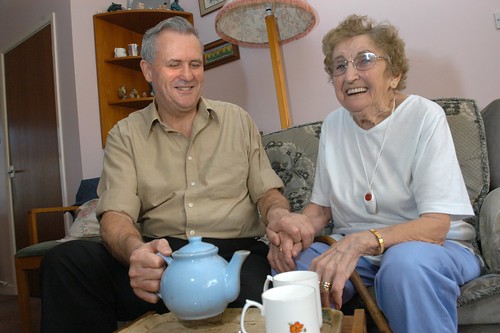Senior Care vs. Staying at Home

British Red Cross, Flickr
While there's no place like home, there have been numerous senior care facilities that have popped up in recent years that come pretty close. From indoor swimming pools, hair salons and cocktail hour to having all of your meals and cleaning taken care of – it's no wonder more seniors are selling their homes and checking in to these 'hotelesque' communities that rival any cruise ship.
However, even with all the enticing amenities, features and in many – chauffeured fieldtrips – the decision to downsize and move into a senior care home is one of, if not 'the,' the toughest decisions we'll make in our 'golden years.'
If you're having a tough time deciding if you're ready to bid farewell to your current home and hang your hat in a senior care facility, this list of pros and cons may help with your choice.
Senior Care Facility Pros
Plenty of Entertainment - Senior Care Homes have come a long way from the sterile institutions that you may recall from the past. Nowadays, these state-of-the-art facilities are lively and upbeat with plenty of entertainment, such as dances, ice cream socials, live entertainment, movie nights, mystery field trips, card tournaments and much more.
You'll No Longer Have to Worry About Cooking - Are you tired of preparing meals for yourself and/or your significant other? Would you rather not have to worry about grocery shopping, prepping food and the clean up duties that comes along with cooking? If that's the case, you may want to consider a Senior Care Home that offers all-inclusive meals. That means, all you'd have to do is show up to the dining room and enjoy your meal. Note: Many of these retirement homes also provide you with your own private kitchenette so you can option to eat in your suite as well.
A Safe Environment - Senior Care Homes provide a safe and secure environment that will bring a peace of mind to residents and their family members knowing that support is close at hand if needed.
Companionship - With upwards of 100 seniors and staff in the same building, there's plenty of opportunity to mix, mingle and make new friends.
Cleaning - As we enter old age, house cleaning can become one of those chores that are too strenuous to perform all on our own. Tasks like vacuuming, mopping and scrubbing can put a lot of strain on our muscles and joints – especially for older adults who suffer from arthritis or any other physical disabilities. A big perk for seniors living in a retirement community is no longer having to worry about cleaning chores since most facilities offer housekeeping services as part of their package.
Senior Care Cons
Downsize - The average retirement home suite is much smaller than a compact apartment – for many, this means having to downsize before moving in. One of the most challenging factors facing seniors looking to move into a retirement community is what they will with all the 'stuff' they've collected over the years. Are you ready to part with furniture and half of your keepsakes?
Cost- Unless you're able to get into a government subsidized care facility, the amount you can expect to pay for to live in a retirement community will vary greatly. On average, most residents of retirement community pay monthly rent for their accommodations – In Canada, monthly fees range from $1,909 to $3,350.

Nany Mata, Flickr
Home Advantages
Privacy - If you feel like eating dinner in your pajamas, walking around in the nude or keeping to yourself, you can still do all three while residing in your home.
Space - You're likely to have more space in your own home than what you'd find in a Senior Care Home.
Room for guests - If you're planning a get together or celebration with family and friends, you can host it in your own home.
Home Cons
Saftey - According to the Public Health Agency of Canada, more than one-half of all injuries sustained by Canadian citizens over the age of 65 are the result of a fall. The frightening factor is that the majority of falls happen within the walls of one's home. The bathroom, which is considered by many to be a place of solstice, is listed as one of the most hazardous areas for seniors. Anyone who chooses to reside in their home well into their 'golden years' should consider investing in their health and safety by purchasing a walk-in tub or walk-in shower.
Maintenance - Let's face it – there's a lot of work that goes hand-in-hand with having your own home. If you don't have it in your budget to hire cleaners or landscapers to tend to your yard, those are tasks that can be burdensome when you aren't feeling up to par.
Social Isolation - Seniors who remain living in their own homes are a high risk of social isolation, which can ultimately affect one's health. According to Aging in Canada, a lonely person is more likely to develop colds and infections, become depressed and be at risk for high stress.
The decision of whether to move into a Senior Care Home or stay put in your current abode, isn't an easy one to make. After reading this list of pros and cons, we recommend you make your own list to determine what's best for you. Good luck!
About the Author:

Beth Wallace is a Safety Specialist for Canadian Safe Step Walk-In Tub Co. She visits the homes of Canadian seniors to show them how they can make their homes safer. Beth wants every senior to have the chance to bathe without the fear and risk of falling. Follow Beth’s journey to make every senior’s bathing experience the best it can be on Google+ and Twitter.
More to Read:
Previous Posts:
Next Posts:




